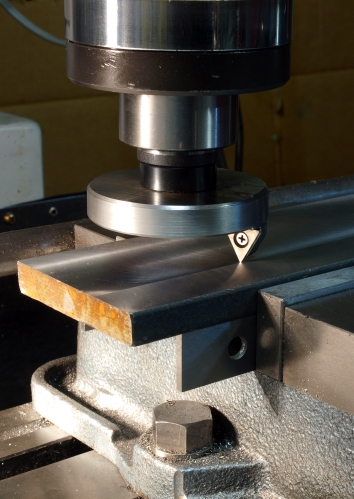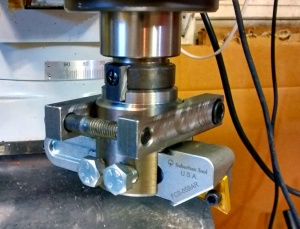 Since the previous two insert cutters I made turned out so well, I decided to try another, a smallish fly cutter.
Since the previous two insert cutters I made turned out so well, I decided to try another, a smallish fly cutter.
I have a Suburban Tools fly cutter and it is a monster by my standards. I got the smallest bar they make (5″, ~$125), cheaped out and made my own adapter (vs buying theirs for ~$200). It is nice but kinda big for my mill and shows that my mill has some kind of funky resonance centered around 1,000 rpm. Pretty annoying shake but everywhere else it is smooth (I’ve run the cutter up to 3,000 rpm). If you look at the picture below, you’ll see why I call it the whirling dervish of flayed flesh. The extra wings are counter balances I added to see if I could tame the resonance. Nope.
 So, this project. One interesting thing about the Suburban tool is that it has a negative rake, ie it “drags”. A plane blade or chisel has positive rake, a scraper [usually] has negative rake. If you stand a chisel on its nose, tilt the handle towards you and pull, you are using negative rake. Leaves a nice finish but [as I understand it] requires more power and rigidity than positive rake. As the inserts I bought have built in rake, I decided to make life simple and mount the insert at 90° (zero) and let the insert provide positive rake (11° for this TPGB 321 insert).
So, this project. One interesting thing about the Suburban tool is that it has a negative rake, ie it “drags”. A plane blade or chisel has positive rake, a scraper [usually] has negative rake. If you stand a chisel on its nose, tilt the handle towards you and pull, you are using negative rake. Leaves a nice finish but [as I understand it] requires more power and rigidity than positive rake. As the inserts I bought have built in rake, I decided to make life simple and mount the insert at 90° (zero) and let the insert provide positive rake (11° for this TPGB 321 insert).
 I wanted to use a disk to keep things as balanced as possible and have the face of the insert on the center line. I had a left over R8 threaded mount (7/8″-20) so I decided to used that for extra rigidity. The disk is ½” mild steel (3″ wide, which ended up giving me a 2.5″ radius cut) with a [vertical] slot cut in it. I machined a rectangular insert mount, also from ½” steel and and proceeded to weld it into the slot backwards. Which really, really steamed my dumplings. Lucky me, I had been anal enough to make everything nice and square so I had reference surfaces I could indicate. Back to the mill and cut a new insert seat.
I wanted to use a disk to keep things as balanced as possible and have the face of the insert on the center line. I had a left over R8 threaded mount (7/8″-20) so I decided to used that for extra rigidity. The disk is ½” mild steel (3″ wide, which ended up giving me a 2.5″ radius cut) with a [vertical] slot cut in it. I machined a rectangular insert mount, also from ½” steel and and proceeded to weld it into the slot backwards. Which really, really steamed my dumplings. Lucky me, I had been anal enough to make everything nice and square so I had reference surfaces I could indicate. Back to the mill and cut a new insert seat.
 It works well. The surface is matte, not shiny like the Suburban tool leaves but still nice and smooth.
It works well. The surface is matte, not shiny like the Suburban tool leaves but still nice and smooth.
I played around with speeds and feeds and the surface shown here (which is ½” hot rolled (black) mild steel) was a skim cut at 2,600 rpm, 11 ipm and 0.001″ DOC, two passes to get full coverage.
And that renounce at 1,000 rpm is still detectable. Damn. But, thankfully, not a big deal.

